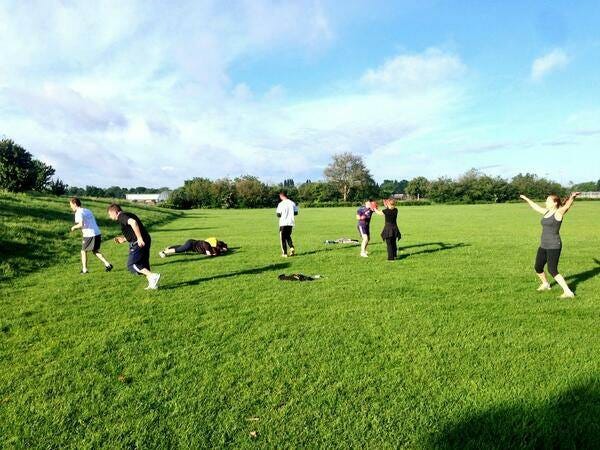The Art of Movement Edition 40: Fail Better - A Short Story About Circuits
www.gabrieljonesperformance.com
WEEKLY CIRCUIT CLASS: Tuesday 15th November, 6:30pm Turnham Green, Chiswick - Come down and get involved!
-------
Check out my Patreon channel for video episodes, on-demand workouts, training programmes, training guidance/advice and more!
Edition 40 - Fail Better: A Short Story About Circuits
You know that old saying, “If at first you don’t succeed, try again?”
Well, what if the second time didn’t work either? What if you failed a third time? Maybe even a fourth? What would you do then? Would you give up or would you keep going until you finally succeeded? We see people giving up all the time. When something challenging and new comes their way, most people panic and run in the opposite direction as fast as they can. It’s scary to put yourself out there, take a risk and fail. But what about when we fail repeatedly at something we really love to do? Do we just give up on it and look for another path instead? Or are there different ways of approaching things that might work better than what we tried before?
When we fail, our first instinct is to just immediately go to plan B and start searching for another way to achieve our goals. Sometimes we even skip A completely and just go straight to B. However, we really should take a moment to reflect on why we failed in the first place and use that information to inform the new way we try to achieve our goals next time. When you fail, you have all the information you need to know what went wrong and what you should do differently next time. You’ve already learned all the lessons the hard way. You just have to be willing to look back on the past and learn from it.
Today I’m going to share with you some examples from my past where I’ve had to learn how to fail upwards in a specific sphere of competency…
So, I had a go at running my first ever ‘boot camp’ 10 years ago (I think of the word ‘boot camp’ as a bit stupid nowadays, I’m not in the military and I don’t run classes in that fashion either, and I’m sure the term may definitely scare off a certain demographic). I had linked up with some friends at work who had a similar ambition and we put a plan for some sessions together. It failed miserably, and our approach, looking back on it now, was laughable!
Maybe it was the 20 (FFS) sessions we planned to run, thinking that we were going to pack out each and every one of them with itching local fitness enthusiasts. Maybe it was the hundreds of flyers through local letter boxes we thought would bring us a heaving crowd which never materialised (huge waste of money as if you couldn’t have guessed). Or maybe it was the fact we simply had no clout. Zero skin in the game. None of us had been personal training longer than a year (the other two guys didn’t even have their level 3 qualification), no client base, no reputation, nada.
So I walked away from this venture, disappointed I hadn’t made my millions. However despite this failure, a couple of years later I was at it again. Ready to do it better:
I decided to form a fitness collective partnership with my best friend, and we named our business GL Active. This time, we had a proper facility in the form of our old school sports hall, with access to their gym, useful contacts at the school who could spread the word and help us populate our classes and build a name for ourselves.
We ran a slick operation, we were consistent, and at one point - I think we were genuinely onto something! We had lots of people attending our classes, enjoying them, spreading the good word, but then all of a sudden - life got in the way. I was offered my scholarship to go and play football in North Carolina, and before I knew it, I was jetting off to the USA without a second glance back at my simmering business prospect.
Once I had returned from the states, I had landed myself that beautiful job at The Hogarth and suddenly, I required a bit less hunger to build ‘my own thing’, a bit less entrepreneurial spirit. Clients were falling into my lap, and the shift work I embraced and enjoyed. But being the dreamer that I am, I still had an itch to do my own thing within this dynamic, and began my ‘Boot Camp Weekend’ phase with The Hogarth, who allowed me to use the facilities and partner with their chefs to run a fancier (and pricier) version of my old camps straight out of the club, which even involved half-time snacks and a social lunch afterwards.
I believe the last one I ran was around 2019, and I couldn’t even tell you why I stopped running them. They were fun, successful and had the potential to be lucrative done properly. I have had to hold the mirror up on many occasions and ask why did each of these ventures fail? Was I really serious about making these events a success?
When we fail, most of us just put it down to bad luck, lack of skill or the universe just not being on our side. However, there might be a deeper reason why we were unsuccessful, and we just might be able to do something about it and prevent it from happening again. When you’ve failed, ask yourself why you failed. What could you have done better? What could you have done differently? Were there certain circumstances or factors that contributed to your failure that you could have controlled or influenced? If so, what can you do differently next time to avoid a repeat of the same failure?
What Went Wrong?
Which elements of your plan didn’t work out? Were you just plain unlucky and things outside of your control went against you? Was your approach to the challenge unbalanced and missing a key element? Maybe you didn’t have the right skills or experience, or you wanted to go about it in the wrong way. Maybe you just weren’t the right person for the job and you tried to do something that you weren’t equipped for. Or maybe you weren’t given the right support, guidance or resources to be successful. Whatever the reason, you need to know what went wrong so you can figure out how to avoid it and succeed next time.
Don’t Dwell on It Too Long
Here’s the most important thing for me - when you’ve failed, don’t waste time dwelling on it. That won’t change the facts. You need to look to the future and determine what you can do to change things for the better. Dwelling on your past failures can prevent you from moving forward, especially if you keep thinking about all the things you did wrong. Instead, think about what you did right, and what you can do differently next time to avoid the mistakes you made before. Think about the skills you need to acquire, the knowledge you need to learn, the people you need to get on your side and anything else that will help you succeed next time.
Do it Differently Next Time
You need to figure out what went wrong and how you can prevent it from happening again. You need to adjust your approach to reflect any new insights, skills and knowledge you’ve acquired since your last attempt. You might even want to try a completely different approach to what you were doing before. You might think that you’ve tried everything and nothing has worked, but sometimes we just need to try something different in order to succeed.
With that in mind - I have now spent the best part of a year working on running my new brand of circuit classes (again), but THIS TIME, I have been using my past mistakes as my deadliest weapon.
Now, instead of running sessions in an isolated school or some random field, I run them bang in the centre of Chiswick, with hundreds of watchful eyes on us every week. Instead of pausing sessions over winter when it gets too dark (thereby destroying all momentum) - I invested in a couple of floodlights, better equipment, and doubled-down on social media promotion to make people aware the class is on and keep people attending over winter. If I can keep a thriving class over the dark, dull, wet and cold Tuesday nights - then next spring and summer, when people actually *want* to train outside - should bring a generous influx of new faces in addition to my existing hardcore group.
Moral of the Story
When you’ve failed, don’t just assume you need to abandon ship and find another route to success. Take a moment to reflect on what went wrong, why it happened and how you can prevent it from happening again. Then try something different next time and don’t be afraid to experiment. You might just find the success that you’ve been looking for. The easy thing to do after a failure is to quit and look for another route to success, but often the best path is the one we're already on - we just have to beat some bushes along the way.
“Ever tried. Ever failed. No matter. Try again. Fail again. Fail better” ― Samuel Beckett
Movement of the Week: Plank Knee to Elbow
2 x 10-12 reps
This exercise is great for developing core stability and mobility. Holding a press up position, the aim is to slowly and carefully draw the knee towards the elbow, making gentle contact as they meet, while maintaining a neutral spine and straight back leg.
That’s all for this week! Check out my Patreon channel for video episodes, on-demand workouts, training programmes, training guidance/advice and more!
Thank you,
Gabriel








